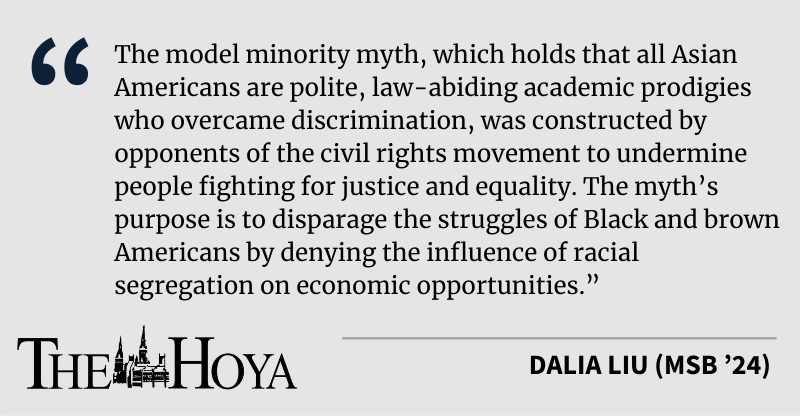Like many of my Asian American friends, I have immigrant parents who came to the United States with no knowledge of English, barely any money and a pull-yourself-up-by-the-bootstraps attitude. By working hard and enduring racism, they were able to build a life for themselves. But my parents are not evidence against the existence of systemic racism in this country.
The denial of systemic inequalities using stereotypes about Asian Americans is a flawed argument rooted in anti-Black sentiments. The model minority myth, which holds that all Asian Americans are polite, law-abiding academic prodigies who overcame discrimination, was constructed by opponents of the civil rights movement to undermine people fighting for justice and equality. The myth’s purpose is to disparage the struggles of Black and brown Americans by denying the influence of racial segregation on economic opportunities.
Rather than acknowledge centuries of systemic oppression that have influenced Black Americans’ ability to achieve economic success, the Trump administration attributes disparities in wealth and opportunities to a lack of motivation. As recently as three days ago, Senior Advisor to the President Jared Kushner suggested that the Black community doesn’t “want” success enough — a line of reasoning that has been disproven time and time again. These beliefs fail to take into account the completely distinct and incomparable histories of each racial group: While Asian Americans have been incarcerated in concentration camps and barred from citizenship, these experiences differ from the enslavement, police brutality and segregation Black Americans have endured for over 400 years. Using Asian American history to undermine Black voices illegitimately compares all minority experiences and ignores the intergenerational impact of history.
The model minority myth not only upholds racist ideology, but also homogenizes the diverse experiences of Asian Americans. It erases the fact that different Asian ethnic groups within the United States have drastically different poverty rates. Burmese Americans experience poverty at a rate nearly triple the national average, while Japanese Americans have a poverty rate less than half the average. Income inequality, a measure of the economic gap between the wealthy and poor, has expanded most rapidly for Asian Americans since the 1970s. The Asian American label encompasses a diverse range of experiences, and the belief that all Asian ethnicities have the same experiences overshadows the very real obstacles some communities continue to face.
For centuries, the model minority myth has been used as a wedge to divide people of color, and unfortunately, this narrative is one too many Asian Americans subscribe to. Resistance against affirmative action policies is only one example of the anti-Black rhetoric that colorism in Asian communities fuels. Despite statistics proving affirmative action doesn’t actually favor Black applicants at the expense of other applicants, many Asian American communities continue to buy into this misconception.
Conflating anti-Asian racism with anti-Black racism only inhibits progress. Asian Americans must recognize that anti-Blackness and colorism in our communities harm all people of color by perpetuating inaccurate assumptions about systemic oppression. Individual hard work alone cannot erase centuries of discrimination, and Asian Americans must fight against policies that have a disproportionate impact on Black Americans.
Only a few decades ago, Asian Americans were the Yellow Peril threatening the American way of life. Since then, we’ve become the model minority. Now, with harmful phrases like the kung flu, rates of racially charged violence against Asians are rising as a result of the pandemic. Acknowledging and combating the transient racism of the Asian American narrative are more important than ever. The characterization of the model minority changes when convenient, and no amount of wealth or success can change the fact that a person of color will always be perceived by their race above all other factors.
Asian Americans are not an example of people overcoming racial discrimination. The idea that racism can be overcome unfairly burdens people of color. It holds those who have experienced racism responsible for not doing enough to help themselves when the blame should fall squarely on the perpetrators of racism. Rather than expecting people to persevere through discrimination, we should be condemning racism and inequality as a whole.
History matters. Perceptions matter. Recognizing the dangers of the model minority myth doesn’t undermine the hard work that immigrant families have undoubtedly had to put in; it merely points out that systemic discrimination continues to negatively affect minority communities.
People of color should not need to be wealthy or successful to be treated with basic decency. The inherent humanity we all have should be enough to warrant dignity that has been historically denied. Reckoning with our country’s racist history and its enduring legacy is not a minority issue — it is an American one.
Dalia Liu is a freshman in the McDonough School of Business.









